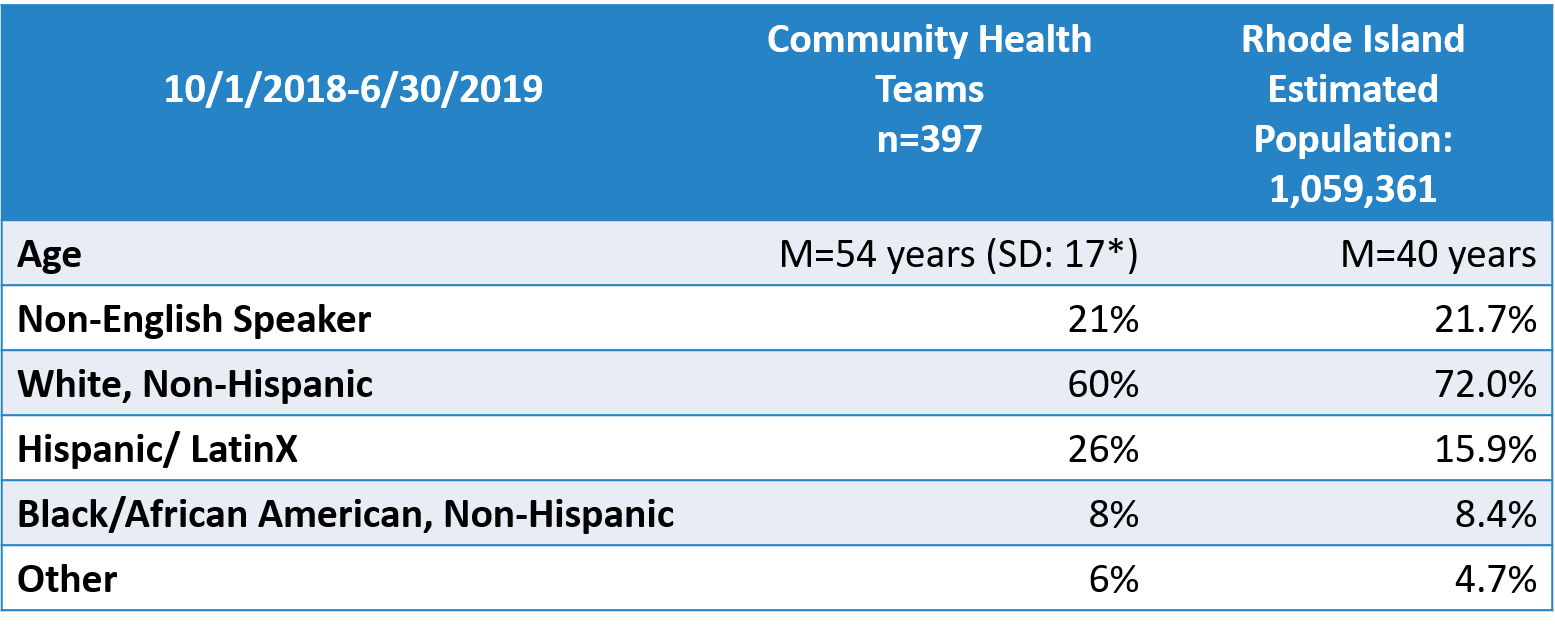Community Health Team Overview & Results
Overview and Results of Community Health Team Program
The Community Health Team model works as an extension of primary care to support patients by facilitating access to community-based services to address complex social, environmental, medical, and behavioral health needs. CHTs work with primary care providers to:
- Identify and triage rising risk, high-risk, and high-cost patients;
- Develop and coordinate patient-centered care plans;
- Provide outpatient behavioral health services and/or coordinate substance use treatment referrals, and;
- Facilitate community supports to address socioeconomic and environmental barriers to care
Who is on the team?
- Community Health Workers
- Behavioral Health Provider
- Peer Recovery Specialist
- Screening, Brief Intervention, and Referral to Treatment (SBIRT) Screener
- Access to Specialty Consultants and Referrals (legal, child/family supports and nutrition services)
Who are we serving? 
Community Health Teams serve culturally-, linguistically-, and economically-diverse patients who meet the high risk criteria identified, including experiencing significant medical needs, behavioral health needs and social needs.
Individuals are being screened at intake. Results show:
- 70% are screening positive for depression
- 57% are screening positive for anxiety
- 9-11% met criteria for Moderate or High levels of Substance Use Risk

Our CHTs are also serving individuals with complex social issues and are able to develop care plans to address these social needs.
“CHTs have improved the integration of medical, behavioral, social and substance-related healthcare in the state of RI, showing substantial improvements in health risk, social determinants of health, behavioral health and wellbeing for these high risks, high need patients.” *
* Redding C.A. (2019, August) SIM Community Health Team Final Evaluation Report. Prepared by University of Rhode Island State Evaluation Team. Rhode Island State Innovation Model Grant #1G1CMS331405. Retrieved from Rhode Island State Innovation Model
Evidence of Impact
Brown University’s Community Health Team (CHT) Cost and Utilization Evaluation Finds Annual Return on Investment of $2.85 for Every $1.00 Spent
A Brown University study examined the South County Community Health Team (CHT) using the All-Payer Claims Database information (2014-2018) against a matched comparison group using a difference in differences analysis to compare the CHT cohort and a control cohort. Looking at 12 months before and up to 12 months after the start of the intervention, the study found a difference of $1563 in total cost of care for each quarter after CHT enrollment. The CHT average length of enrollment was 9.1 months and there was an average annual cost per client of $1625. Using the cost savings produced in the evaluation, there is an annual return on investment of $2.85 for every $1 spent.
Findings from a recent evaluation completed by the University of Rhode Island* confirm that the program is serving the intended patient population and supports the effectiveness of the CHT model. Over the course of the study, several statistically significant and clinically meaningful changes were demonstrated:
Clinically & Statistically Significant Client Changes after 4.7 months of CHT Care

Additionally:
Evidence suggests that embedding SBIRT within CHTs significantly reduces patients’ substance use behaviors. People who received brief substance use interventions reduced their past 30-day substance use by 30-40% at 6-month follow up.
Data from one large partner site demonstrated that in spite of high levels of health and social needs, clients who participated in CHT care met or exceeded most UDS targets for quality medical care.


Sustaining the Community Health Team Model
To fully build out and sustain the CHT integrated team model, CTC-RI has convened a Board-level public/private Oversight Committee to lead a robust effort to:
- Move the program toward a fully sustainable, multi-payer funding model that reflects the diverse patient population who benefit from CHT services and supports.
- Apply what is learned from 2019-20 pilot initiatives and partnerships to fully transition from an individual-centered to family-centered CHT care coordination model.
- Continue to gather evidence to demonstrate outcomes, with a laser focus on how to best improve outcomes while also reducing the total cost of care.
- Expand and strengthen the CTC-led, centralized, CHT Statewide Network.
Our Mission
The mission of CTC-RI is to support the continuing transformation of primary care in Rhode Island as the foundation of an ever-improving integrated, accessible, affordable, and equitable health care system. CTC-RI brings together critical stakeholders to implement, evaluate and spread effective multi-payer models to deliver, pay for and sustain high-quality, comprehensive, accountable primary care.
